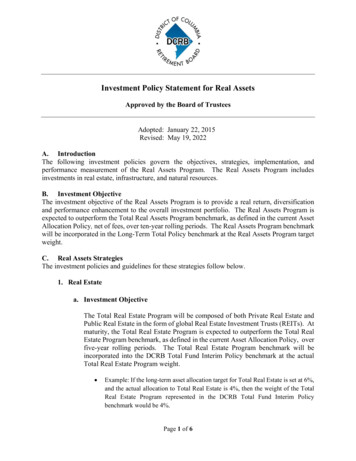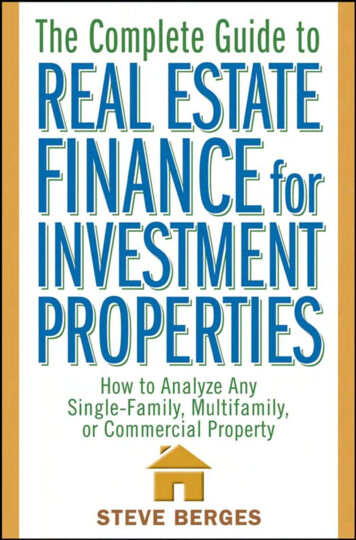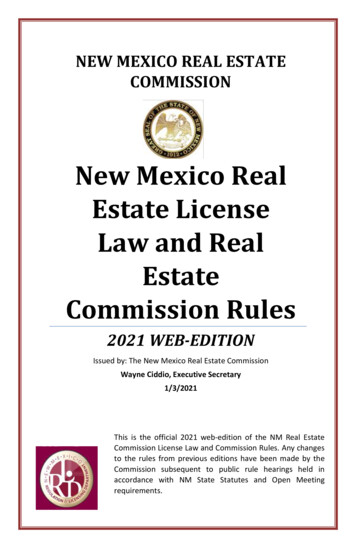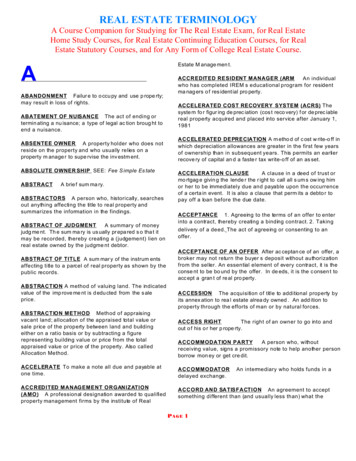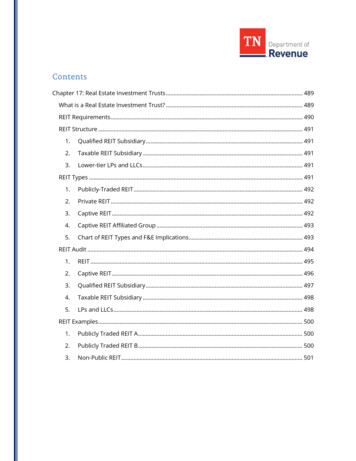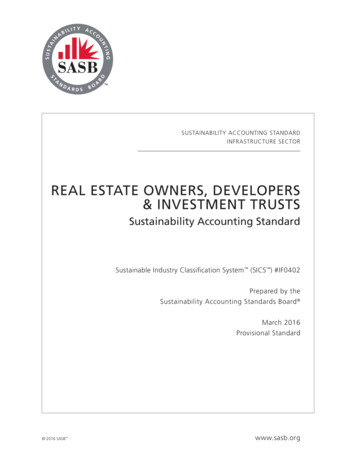
Transcription
Real Estate Investmentin ItalyTHE LEGAL PERSPECTIVE
REAL ESTATE INVESTMENT IN ITALYIntroductionThe Italian real estate market spiked in 2017, hittinga record figure of EUR11 billion in 2017. In spite ofpolitical turmoil affecting Italy and other Europeancountries the market is still very hectic.Much of the investment appetite comes from newinvestors which had not previously targeted the Italianmarket, while more traditional investors still havestrong interest for the Italian market. The NPL-UTPmarkets have still many unexplored investment pockets.Yield expectations hit a record low for office spaces inMilan and high-street retail.This scenario requires a highly specialized approachand, in this respect, real estate is a key practice area forDLA Piper. Our sector approach provides our clientswith the highest level of legal assistance in respect of allthe areas involved in real estate investments such as,town planning, environmental, corporate, finance, tax,restructuring and investment funds.This guide provides an overview of how the legalsystem in Italy operates and is aimed at coveringthe basics relating to investing in the Italianreal estate market as a foreign investor. It isintentionally not an exhaustive guide.2
WWW.DLAPIPER.COMContents6.4 Main terms and conditions in lease1. OWNERSHIP OF REAL ESTATE 041.1 Property rights 041.2 Co-ownership and condominium 041.3 Restrictions 042. ACQUISITION OF OWNERSHIP 052.1 Formal requirements 052.2 Registration 052.3 Asset deals 057.4 Taxation on distributions 162.4 Share purchases 067.5 Taxation on disposals 167.6 Real estate funds 177.7 SICAF 188. REAL ESTATE FINANCE 208.1 Interest rate risks 208.2 Securities and collateral agreements 20agreements 2.5 Real estate investment fundsand SICAFs 073. OTHER RIGHTS TO PROPERTY 083.1 Mortgages, pledges, privileges 083.2 Easements 083.3 Pre-emption rights 093.4 Condemnation (compulsory purchase) 094. ZONING AND PLANNING LAW PERMITS 105. ENVIRONMENTAL LIABILITY 116. LEASES 126.1 General overview 126.2 Property lease agreements 126.3 Business lease agreements 12136.5 Public sector tenants 147. TAX 157.1 Taxation on acquisition 157.2 Property taxes (IMU) 157.3 Taxation of rental income from real estate –ongoing taxation for the owner of real estate 158.3 Taxation and fees on the creationof security 208.4 Lending activity 218.5 Corporate rules 21GLOSSARY 22CONTACTS 23ABOUT DLA PIPER 233
REAL ESTATE INVESTMENT IN ITALY1. Ownership of real estate1.1 Property rightsthird party with rights similar toreal estate complex. The rights ofIn Italy there are various types ofthose granted to the full owner.co-ownership in a condominiumrights relating to real estate assets:The leaseholder pays a rent toare expressed in millesimithe bare owner, must enhance(i.e. participation interests calculatedthe property and is grantedon the basis of 1/1,000) and listedownership (piena proprietà) –the right to become full ownerin a millesimal chart; the millesimalthe right to fully and exclusivelyby paying a certain amount.quota represents the value of theenjoy and dispose of the property:This right may be perpetual andvoting rights of each member ofthe broadest right which may beits duration cannot be less thanthe condominium.held in real estate.20 years. This right is rare in Absolute freehold or full Right to build (diritto di superficie)– the right to build and maintaincommon practice. Easement (servitù) – anThe co-owners may adoptcondominium regulationsa building on or underneath aencumbrance (onere) burdening(mandatory where there are morethird party’s property, granteda property in order to providethan ten co-owners) laying downfor a specific period of time.another property, owned byrules governing, for instance,When this expires the landownera different person/entity, withthe use of the common areas andbecomes the legal owner of thea direct advantage (utilità).the common plant, the allocationbuilding. It is also possible toThese rights are all classified as inof relevant expenses and thesell the title to a building withoutrem rights (diritti reali), as furthermanagement of the condominium.owning the title to the underlyingdetailed below.land (where the seller is a publicmaximum 99-year term).1.2 Co-ownership andcondominium Beneficial interest (diritto diProperty rights, including the rightauthority the sale will be for aThe right of co-ownership mayonly be transferred together with atransfer of the owner’s interest.sufrutto) – the right to enjoyof full ownership of real estate,1.3 Restrictionsa third party’s real estate formay be co-owned by two or moreIn general, there are no restrictionsa specific period of time. Thispersons, companies and/or otheron the purchase of real estatecannot be longer than the lifetimelegal entities.assets by foreign investors.of the beneficiary if they are anHowever, where an investment is byindividual, or more than 30 yearsCo-ownership can also take the formway of the purchase of shares in aif the beneficiary is a legal entity.of condominium: usually in relationcorporate vehicle, there are certainThe beneficiary can use theto housing but also, in certain cases,restrictions that may be imposed byreal estate in the same way asto shopping malls where differentthe Foreign Ministry (Ministero deglian owner, including having theunits in the same building and/Affari Esteri).right to collect interest or to grantor different buildings in the sameleases, provided the original usereal estate complex are owned byIn rare cases mandatory pre-is maintained.different owners but some of theemption rights apply to the sale ofareas and services are used byreal estate assets. (See paragraphthe owners collectively.3.3 Pre-emption rights).the needs of the person holdingThe members of the condominiumThere are other restrictions on salesthe right and those of theirhave a right of co-ownership overby an individual in a family context.immediate family.the common assets which are Right of use (diritto d’uso e diabitazione) – the right to usereal estate in order to meet Emphyteusis or long lease4proportionate to the value of their(diritto di enfiteusi) – a right torespective interests in relation toenjoy a property owned by athe value of the entire building/
WWW.DLAPIPER.COM2. Acquisition of ownershipInvestments in real estate in Italycan be made in various forms.There are two main alternativestructures available: asset purchase; and acquisition of shares in theasset-owning corporate vehicle(i.e. a share purchase).2.1 FormalrequirementsA deed of transfer must be madein writing and authenticated by apublic notary in order to be filed(trascritto) with the Real EstateRegister (Conservatoria deiRegistri Immobiliari).Preliminary contracts must takethe same form as the final deed oftransfer and therefore must also bein writing.The content of the contract isnegotiable but must include theprice; the identity of the propertyor of the quotas/ shares to betransferred in the case of a sharepurchase; details of the relevantbuilding permits; and rulesregarding the allocation of risks andbenefits relating to the property.When the contract is signed in frontof a public notary, the means ofpayment, details of the real estateagent involved and the agencyfee must be indicated in thenotarial deed.2.2 RegistrationAlthough it is not a requirementfor validity, deeds are usually filedwith the publicly available RealEstate Register (Conservatoria deiRegistri Immobiliari) held by eachmunicipality. This avoids conflictswith future buyers and third parties.The register records informationundeveloped land is recorded, andrelating to the property, includingthe Building Cadastre in whichsales and purchases, mortgages,buildings are recorded. Both landeasements, rights of use and alland buildings must be registeredthe in rem rights, as well as anyand after registration are attributedpending disputes.a cadastral income. This formsthe basis for calculating theAn in rem right, including the rightmunicipal property tax (IMU-IUCof full ownership, is not effectivesee paragraph 7). Cadastral incomeagainst the person who effected acan be subject to review by thefiling (trascrizione) on the property ifrelevant authority.it is registered after the filing of thatperson’s right, even if the relevant2.3 Asset dealsright was acquired earlier.Investors usually prefer asset deals,since they do not carry any risks notA filing can benefit from these rulesdirectly related to the property andonly if the previous acquisition deedallow the real estate to be acquiredhas also been properly filed (thewithout further material or people.rule of continuity of filings, i.e. anuninterrupted chain of ownership).In Italy an asset deal may bestructured as: (a) an acquisitionPreliminary agreements relatingof a real estate asset; or (b) anto an existing property or to aacquisition of an ongoing business.property under constructioncan also be registered in orderIn the purchase of an ongoingto protect the buyer against anybusiness, the purchaser is legallysubsequent filing of third parties’obliged to step into existingrights or a second sale of thecontractual relationships and tosame asset. This protection stopstake over certain liabilities as part ofone year after the completionthe public law authorization for thedate specified in the preliminarycarrying on of the business.agreement and, in any event, threeyears after the registration of theUsually, the parties to thepreliminary agreement.transaction enter into an agreementsuch as a letter of intent or heads ofThe filing of a preliminaryterms, providing the potential buyeragreement does not have the samewith an exclusivity period in which toeffect as a final agreement, but itcarry out the due diligence.gives retrospective effect to the finalagreement as from the date of filingof the preliminary agreement (thebooking effect – effetto prenotativo).Real estate is also registered in theCadastre Register, which is heldby the municipality in which theproperty is located, and consistsof the Land Cadastre, in which5
REAL ESTATE INVESTMENT IN ITALYBefore buying a property it isBy law, the seller guarantees that itIn these situations, it is highlynecessary to be aware of:has title to the property, and that theadvisable for the investor to appointproperty is free from any third-partyprofessionals in order to carry out its history;rights and from any defects thatlegal and technical due diligence the legal title held by the seller,might prevent the agreed use of thecovering all legal aspects relating toand any defects or problemsproperty or have a negative impactthe shares of the target company,with it;on its value. Breach entitles the buyerexisting debts, receivables, liabilities,to request the termination of thecontracts executed by the targetagreement with a full refund of thecompany, financial statements, agreements with neighbors;price, as well as payment of anyand the company books. possible encumbrances;additional damages. Alternatively, environmental issues; and (forthe buyer may ask for a reduction inIn relation to the corporatethe price. Breaches must be notifiedgovernance of Italian corporatewithin eight days of discovery andvehicles, be aware of the following: planning permissions that allowedit to be built;ongoing business sales): commercial authorizations andother necessary public permits; and all the contracts concerning thebusiness, including employmenta one-year limitation period appliesfrom the date the buyer takespossession of the property.agreements. In a limited liability company(Srl) considerable flexibility canbe agreed in the by-laws andMost statutory warranties arevoting and profit rights can beNormally, public notaries carrynegotiable. Current practice is tofreely allocated. The holdersout a search on title in thelimit the extent of the warrantiesof the quotas can appointReal Estate Register. The notary’sand to place more importanceand remove directors andreport is usually part of the legalon the role of due diligence bymay also have approval rightsdue diligence and includes anexcluding liability for any issuesover management decisions.investigation into the existencedisclosed through due diligence.The directors are responsible forof any third party rights as well asday-to-day business decisions.the seller’s title to the property.In new property the buyer has aThe company can be managed byAn investor will usually appoint aten-year warranty under statutoryeither a sole director or a boardnotary public to provide an updatedlaw. The developer is liable if theof directors. A board of statutory20 year notarial report (relazionestructure collapses or suffers fromauditors is required if (i) certainnotarile ventennale), which is the onlyserious defects.thresholds relating to turnoverdocument giving legally conclusiveand number of employees areevidence of legal title to the property2.4 Share purchasesand the relevant encumbrances.A vendor may want to obtain specific(ii) the Srl is required to preparetax benefits by selling the sharesconsolidated financial statements,Title insurance is new in Italy,of the corporate vehicle instead ofor (iii) the Srl is the controllingand not common practice.selling the property directly. Mostentity of a company which isexceeded for two years, ordouble tax treaties signed by Italysubject to accounting control.Generally it is for the buyer to satisfyexempt the profit derived from theUnless the contrary is stated initself about the issues coveredsale of shares from taxation in Italythe articles of incorporation thein due diligence but the sellerif the selling shareholder is not taxSrl will be audited by a singlecan be asked about key issues ofresident in Italy.statutory auditor.concern which may affect the value,occupation or use of the property.It may also be that the corporatevehicle was used for developmentMisrepresentation by the selleractivities and that the vendor wishesmay lead to cancellation of theto transfer all liabilities deriving fromagreement, the payment ofthe development to the purchaserdamages, a reduction in the priceby selling the corporate vehicle asor, where appropriate, the sellersuch. Sales of the corporate vehiclebeing required to rectify anyinstead of the property itself arespecific defects.becoming increasingly popular inthe Italian real estate market.6 In a joint stock company (SpA)different categories of shareswith different rights can becreated. Voting and profit rightscan be freely allocated. An SpAcan be managed in any of thefollowing ways: (i) by a soledirector or a board of directorsappointed by the shareholdersmeeting (the traditional system);(ii) by a supervisory board and
WWW.DLAPIPER.COMa management board (theAn Italian real estate investmentInvestors participate in a real estatetwo-tier system); or (iii) by afund whose units can be subscribedfund by subscribing or purchasingboard of directors appointed(or purchased) only by professionalunits. Several unit classes can beby a shareholders’ meetinginvestors and by the other investorsissued, provided that investorsand an executive committeeidentified by the Decree of thesubscribing the same unit classof the board (the one tierMinistry of Finance no. 30 of Marchare granted the same powerssystem). The appointment of5, 2015 is described as reserved.and duties.The shareholders may chooseA reserved real estate investment2.5.2 SICAFto appoint a board of statutoryfund may be established andAn Italian real estate SICAF is aauditors comprising either threemanaged by an Italian managementclosed-end AIF under the AIFMDor five permanent members,company which is licensedand the UFA, i.e. it is a schemein which case two alternateby the Bank of Italy or by anestablished as a joint stock companymembers must also be appointed.authorized entity resident in an EU(SpA) with fixed capital and aMember State.registered office located in Italy,statutory auditors is mandatory.2.5 Real estateinvesment fundsand SICAFs2.5.1 REAL ESTATEhaving as its exclusive corporateItalian reserved real estatepurpose the investment of theinvestment funds must be managedassets collected through the issue ofin accordance with a predeterminedshares (or other equity instruments),investment policy and must:among a plurality of investors,managed as a whole in the interestINVESTMENT FUNDSReal estate investment funds invest an amount equal at least toof its investors and independently(fondi di investimento immobiliari)two-thirds of their total value in:are quite common as an instrument(i) real estate assets; (ii) rights in remto invest in real estate assets,over real estate assets (iii) equityIt is invested mainly in real estateespecially by institutional investors.interests in real estate companieson the basis of a predetermined(società immobiliari); (iv) otherinvestment policy.According to the Directive 2011/61/EU on alternative investment fundmanagers (AIFMD) and to theLegislative Decree 58/1998 – theso-called Unified Financial Act, (UFA),an Italian real estate investmentfund is a closed end alternativeinvestment fund (AIF), i.e. it is ascheme established and managedby a manager as a segregatedpool of assets divided into unitsand collected, through one or moreissues of units, among a pluralityof investors, managed as a wholein the interest of the unit holdersand independently from them.It is invested mainly in real estateon the basis of a predeterminedof them.real estate AIFs; and invest any remaining third oftheir total value in other legallypermissible assets.They cannot directly carry out anybuilding activity.There are risk concentrationrules aimed at limiting the stableinvestment of the fund’s assetsin single properties. These riskconcentration limits can bederogated from in the case ofreserved funds, but a de factoSICAFs are subject, in general,to the same regulations providedfor other AIFs with respect to,inter alia, investment activity, riskconcentration limits, plurality ofinvestors, etc., of course adjustedto the different nature of theSICAF (i.e. an AIF constitutedunder statute) as opposed toother AIFs constituted under thelaw of contract.The establishment of a SICAF mustbe authorized by the Bank of Italy.minimum level of diversification ofrisks must be ensured.investment policy.7
REAL ESTATE INVESTMENT IN ITALY3. Other rights to property3.1 Mortgages,pledges, privilegesJudicial awards and orders ofeasements require the existencepayment issued by a court entitleof a relationship between twoA mortgage (ipoteca) is an in remthe creditor to establish a mortgageproperties, the burdened one (fondosecurity which burdens real estateover the properties of the debtorservente) and the benefited oneassets and, in particular, it is the(ipoteca giudiziale). Establishment(fondo dominante), without prejudicemost common form of security overof the mortgage will be valid uponto the possibility of establishingreal estate (which includes the land,filing with the Real Estate Register.reciprocal easements between thebuildings erected on it and fixtureswhich form part of those buildings).burdened properties.A property may be burdened bymore than one mortgage, in whichA non-exhaustive list of the mostThe creditor holding a receivablecase, a claim regarding the creditcommon type of easementssecured by a mortgage issecured by the senior mortgageincludes rights of way (servitù dientitled to start an expropriation(first ranking mortgage) has prioritypassaggio) which could be with(espropriazione) in respect of theover those concerning receivablesvehicles and/or pedestrian (carraioburdened property. Followingsecured by junior mortgagese pedonale) and which generallythe enforced sale, the proceeds areestablished subsequently (classifiedallow passage through part of onedistributed among all creditors inas mortgages of second ranking,property to reach another, electricthe enforcement procedure, afterthird grade, fourth grade etc.).pipeline easements (generally inprior payment of the beneficiary oforder to allow the main electricBeing an in rem right, mortgages dooperators to place, maintainnot terminate automatically in theand operate electric booths andA mortgage may burden notevent of transfer of the propertiespipelines for the distribution andonly the right of full ownershipburdened by the same, indeed theysupply of electricity); gas pipelineover real estate, but it may be“follow” the property and stay witheasements, etc.established also over certain otherthe same (so-called ius sequelae).the mortgage.Being in rem rights, easementsreal estate rights, eg rights tobuild (diritti di superfice), beneficialUnlike a mortgage, a pledge (pegno)can be enforced vis-à-vis thirdinterests (diritti di usufrutto), bareis an in rem security which burdensparties, and they do not terminateownership (nuda proprietà).only movable assets and notin the event of the transfer of thereal estate assets. Finally, variousproperties affected (adversely orA mortgage may be established byclaims, collectively referred to asusefully) by the same, indeed theymeans of a voluntary deed of theprivileges (privilegi) have statutory“follow” the property and stay withdebtor (or of a third party over itspriority against the claims of otherthe same (ius sequelae).properties) (ipoteca volontaria) butcreditors in relation to the proceedsin certain cases the law expresslyof a debtor’s property, e.g. the stateTypically easements are establishedentitles a creditor to establish afor direct and indirect taxes.by means of a contract entered intomortgage over the properties ofby the owners of two properties,the debtor (ipoteca legale), mostIn principle, pledges prevailbut they could be also establishedimportantly the right granted to aover privileges over movables,by means of an administrativeseller of a real estate asset in orderand special privileges over realmeasure or judicial awards.to secure the payment of the price.estate assets and immovableproperties prevail over mortgages.Mortgages must be executed byThe agreements which establisheasements must be in writing and,deed in front of a Notary Public3.2 Easementsand must be filed (iscritta) with theAn easement (servitù prediale)third parties (e.g. the purchaser ofrelevant Real Estate Register inconsists of an encumbrance (onere)the affected properties), must beorder to be validly established.burdening a property in order toexecuted by means of a notarialprovide another property, owneddeed and filed (trascritti) with theby a different person/entity, withReal Estate Registers.a direct advantage (utilità); indeed8in order to be effective vis-à-vis
WWW.DLAPIPER.COMIt is also possible to affect aIn the case of commercial leaseFurthermore, in the event of aproperty by establishing personalagreements (lease agreements fortransfer of agricultural land whichrights over the property in favor ofnon-residential use) tenants carryingare let to small independenta person/entity, rather than in favorout activities involving direct contactfarmers (coltivatori diretti) pursuantof another real estate asset. Suchwith the public (as users andto a lease of agricultural land, therights would be not considered asconsumers) have a pre-emptionlessee is granted a pre-emptionin rem rights, but as personal rightsright if the landlord intends to sellright (agricultural pre-emption(diritti personali), not enforceablethe property they are leasing duringright), provided that certainvis-à-vis third parties and having nothe term of the lease; in particular,requirements are met. In addition,automatic ius sequelae in the case oftenants are entitled to purchasethe agricultural pre-emption righta transfer of the affected property.the premises on the same termsis also granted to direct farmersand conditions.owning adjoining land.determine whether any easementsIn Italy some real estate assets areadversely affect the targetconsidered protected because of3.4 Condemnation(compulsory purchase)property, or whether the lattertheir historical or landscape value.Condemnation is possible butproperty is granted easementsIn this case the building or areaonly where specific permission isin its favor or also. Considerationwill be subject to a number of legalgranted in accordance with themust also be given to whetherburdens, and any work involvinglaw. Moreover, expropriation isthe implementation of a plannedthe property is subject to the prioronly allowed if this is in the publicinvestment such as the developmentauthorization of the competentinterest and in such cases the stateof land or the enhancement ofpublic authority (Soprintendenza).must pay compensation to thea shopping mall requires theMoreover, the state has a pre-parties involved.establishment of easements in favoremption right over properties withof the purchased property.historical or landscape value. DeedsFor an investor it is advisable to3.3 Pre-emption rightsof conveyance relating to suchproperties therefore have to beIn rare cases mandatory pre-mandatorily served on the relevantemption rights apply to the sale ofpublic authority and are conditionalreal estate assets.upon the exercise of the state’spre-emption right.9
REAL ESTATE INVESTMENT IN ITALY4. Zoning and planning law permitsIn Italy, different levels ofChanges in use that involve aWorks can be startedgovernment (20 Regions,transfer from one use category toimmediately after the filing,103 Provinces, over 8,000another (the principal categoriessave for the power of theMunicipalities) have land useare: residential, commercial,Municipality to controlplanning tasks assigned toindustrial, offices) require thethe existence of the legalthem. The state is responsibleissuing of a building title andrequirements to performfor guidance and coordination.the payment of related fees. Onthe declared activities, in theAs a consequence, town planningthe other hand, changes thatsubsequent 30 daysregulations are structured oninvolve a change within the samefour different levels: (i) the State,category and that do not need main(ii) the Region, (iii) the Province andrefurbishment works do not require(iv) the Municipality.any fee payment.The State sets the general rules andGenerally speaking, any constructionguidelines for planning and buildingactivity is subject to a building title.law which are then implementedThere are three types of buildingBuilding titles related to newon a regional, provincial ortitles (minor works do not need abuildings or refurbishment worksmunicipality level.building title but the Municipality(ristrutturazione edilizia) aremust be notified):subject to the payment of a feeThe Municipalities are the centralpoint in the definition of programmesadministrative licenses issued byof land. They approve the Generalthe Municipalitydifferent names, depending on theregional laws).Each building must be compliant withthe General Town Planning Instrumentprovided at municipal level.As to the designated use, buildingsconstructed legitimately before thecoming into force of the GeneralTown Planning Instrument arelegitimate even if not in compliancewith the new General Town PlanningInstrument and can be maintained,but not modified.10commencement of works(comunicazione di inzio lavoriasseverata), i.e. an instrumentsimilar to the SCIA, related toworks with a minor impact(contribution on construction cost) the building permits, i.e.for development and transformationTown Planning Instrument (which has the CILA communication of the SCIA – certified declarationof commencement of works(segnalazione certificata di inizioattività), i.e. a communicationfiled by the developer with theMunicipality (and signed by anarchitect or an engineer, whoshall attest that the works tobe carried out are compliantwith relevant regulations)and by means of which thedeveloper merely communicatesto the local competentadministration its intention tobegin the construction works.to the Municipality.Buildings of historical or landscapevalue are subject to special rules.Under Italian law, in order to carryout retail activity the operatorneeds a trade license granted bythe Municipality or by the Region,depending on the sales area.
WWW.DLAPIPER.COM5. Environmental liabilityItalian legislation, specificallyInstrument a strategicevaluation (VIA) whose mainLegislative Decree 152/2006 (theenvironmental evaluationpurpose is to provide an overallEnvironmental Code), provides for a(VAS) aimed at verifying theassessment of the environmentallist of developments with a potentialsustainability of the plan orimpact of each project and ofimpact on the environment:program from an environmentaltheir execution, is needed.point of view is needed. In the case of developmentsrequiring a variance to theGeneral Town Planning For developments with a potentialimpact on the environment,an environmental impact11
REAL ESTATE INVESTMENT IN ITALY6. Leases6.1 General overviewSince the execution of a businessIn any case, should a business leaseCommercial lease agreementslease agreement instead ofagreement not actually have as itscan be:a property lease agreementobject a genuine going concern,traditionally relied on the widerthe risk is that it may be re-classified property lease agreementsfreedom granted to the parties inas a property lease agreement,(contratti di locazione); orthe negotiation of the contractualto which the mandatory provisionsterms and conditions, it is clear thatof the Tenancy Law apply. business lease agreements(contratti di affitto d’azienda).this advantage currently only appliesto non‑residential lease agreementsA further risk is in relation to the6.2 Property leaseagreementswith a rent to equal or loweremployees that may be hiredthan EUR250,000.by the lessee during the lease.Property leases are generally6.3 Business leaseagreementsdivided into (i) non-residential (alsoreferred to as commercial) leases i.e.for offices, retail space, hotels, etc.);and (ii) residential leases.The Italian Tenancy Law containscertain mandatory p
7.3 Taxation of rental income from real estate - ongoing taxation for the owner of real estate 15 7.4 Taxation on distributions 16 7.5 Taxation on disposals 16 7.6 Real estate funds 17 7.7 SICAF 18 8. REAL ESTATE FINANCE 20 8.1 Interest rate risks 20 8.2 Securities and collateral agreements 20 8.3 Taxation and fees on the creation
